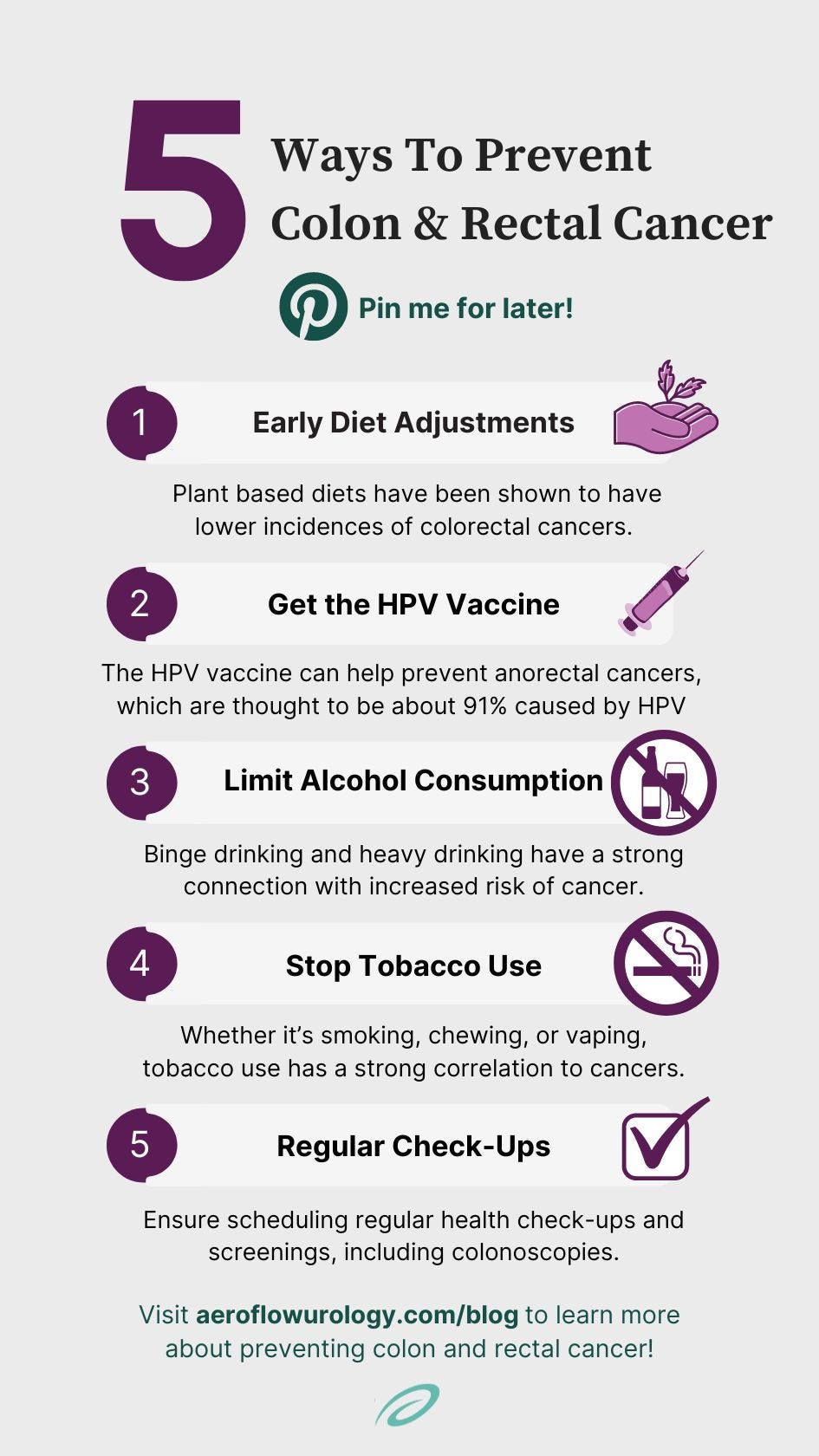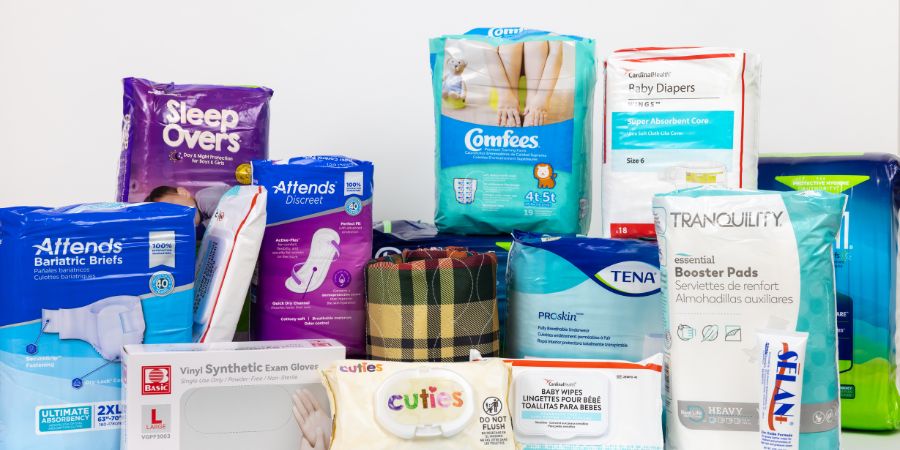Key Takeaways:
- Bowel leakage, also known as bowel incontinence, can be a sign of colon and rectal cancer.
- Early preventative measures, such as dietary changes, tobacco and alcohol cessation, and screenings, can reduce your risk of developing colon and rectal cancer.
- Pelvic floor therapy, certain medications, and surgeries may all help to lessen symptoms of fecal incontinence.
Colon cancer, medically referred to as colorectal cancer, is a prevalent global health concern, ranking as the third most common cancer worldwide, according to the World Health Organization.
In the past, this condition mainly affected adults over 50 years old. However, there's been a noticeable surge in diagnoses among younger demographics.
This alarming uptick in cases of colon cancer emphasizes the importance of understanding the causes, symptoms, and preventative measures associated with colon cancer, rectal cancer, and related conditions like bowel incontinence.
INCONTINENCE PRODUCTS THROUGH INSURANCE:
Aeroflow Urology is in-network with many Medicaid and Medicaid-managed insurance plans and is accredited by Medicaid. Complete our Eligibility Form, and we’ll automatically check to see if your plan covers incontinence supplies. ***Must meet certain requirements to qualify.***
You will also receive the care and attention every person managing incontinence deserves: A personalized list of 100% insurance-covered incontinence supplies, a dedicated Continence Care Specialist you can contact during business hours, a user-friendly online portal for easy monthly reordering, and educational content.
Get the continence care you need with the dignity you deserve. Join the Aeroflow Urology family today! It only takes 5 minutes to get started.
What Is Colon Cancer?
Colon cancer, also called colorectal cancer, is the third most common cancer in the world, according to the World Health Organization (WHO). While colon cancer has been most common in adults over the age of 50 historically, healthcare providers have recently seen an increase in colon cancer diagnoses in younger populations. The condition is on the rise in adults in their 20s, 30s, and 40s.
Colon cancer starts in the lining of the large intestine when mutations occur in the cells. The mutations cause malignant cells to grow quickly. When the abnormal cells multiply rapidly, they form polyps, which can become cancerous tumors if not diagnosed and removed.
Causes of Colon Cancer
- Excessive intake of processed meats.
- Too little intake of fruits and vegetables.
- Sedentary lifestyle.
- Aging
- Obesity
- Smoking or vaping.
- Excessive alcohol consumption.
Signs of Colon Cancer
- Change in bowel habits, such as constipation or diarrhea.
- Stomach or abdominal pain.
- Gas
- Weight loss.
- Vomiting
- Blood in stool.
- Fatigue or tiredness from anemia.
If you have any of these symptoms, speak with your healthcare provider.
What Is Rectal Cancer?
Rectal cancer occurs when abnormal cells turn into polyps which grow on the inner lining of your rectum. These polyps can turn into cancerous tumors if not diagnosed and removed.
Causes of Rectal Cancer
Rectal cancer occurs when abnormal cells turn into polyps which grow on the inner lining of your rectum. These polyps can turn into cancerous tumors if not diagnosed and removed.
- Excessive intake of highly-processed meats.
- Sex (males are more likely to develop rectal cancer).
- Obesity
- Smoking or vaping.
- IBD, Crohn’s disease, ulcerative colitis.
- Aging
Signs of Rectal Cancer
Rectal cancer occurs when abnormal cells turn into polyps which grow on the inner lining of your rectum. These polyps can turn into cancerous tumors if not diagnosed and removed.
- Changes in bowel habits, such as constipation or diarrhea.
- Fatigue or tiredness.
- Weakness
- Stringy or thin bowel movements.
- Abdominal pain.
- Weight loss.
- Rectal bleeding.
If you have any of these symptoms, speak with your healthcare provider.
What Is Bowel Incontinence?
Bowel incontinence, also called fecal incontinence, is the loss of bowel control that typically results in uncontrollable fecal leakage.
Causes of Bowel Incontinence
There are many causes of bowel incontinence, and the condition can develop in children and adults.
- Chronic constipation.
- Blockage in the intestines.
- Using laxatives excessively for an extended period.
- Surgeries, such as prostate surgery, rectal surgery, or hysterectomy.
- Childbirth - both vaginal and Cesarean deliveries
- Nerve damage
- Tumor
- Injury to the rectal muscles or nerves (spinal cord injury).
- Diarrhea
- Stress or anxiety.
- Irritable bowel syndrome (IBS), Crohn’s disease, ulcerative colitis.
- Hemorrhoids
- Rectal prolapse.
Signs & Symptoms of Bowel Incontinence
- Experiencing sudden urges to make a bowel movement, resulting in leakage.
- Leaking fecal matter without realizing it.
- Leaking fecal matter when passing gas.
- Constipation
- Diarrhea
If you experience any symptoms of bowel incontinence, you should speak with your healthcare provider to diagnose and address your condition.
Relationship Between Bowel Incontinence, Colon, & Rectal Cancer
Bowel incontinence can be a sign of both colon and rectal cancer, so it’s essential that you speak with your healthcare provider if you’re experiencing fecal leakage.
Bowel Incontinence & Colon Cancer
When there is a bowel obstruction secondary to a colon mass / cancer, your body wants to keep things moving in the colon.
Therefore, your body will push stool past the blockage in the colon, which is typically more loose, causing more irritation to your colon lining, leading to uncontrolled leakage of stool.
Colon cancer treatments, such as surgical removal of the cancer, chemotherapy, and radiation, have high incidences of resulting in fecal incontinence.
Bowel Incontinence & Rectal Cancer
The process your body goes through during rectal cancer is similar to colon cancer.
However, rectal cancer could involve your internal sphincter and surrounding musculature, causing less function of those structures, leading to fecal incontinence.
Again, similar to colon cancer, treatments for bowel incontinence, such as surgical removal, chemotherapy, and radiation, have a high likelihood of causing fecal incontinence.


Preventing Rectal & Colon Cancer
Since colon cancer has been on the rise in younger individuals, preventing colon and rectal cancer is key.
1. Early Diet Adjustments
Adjusting your diet early on is one of the easiest ways to reduce your risk of colon cancer. Unfortunately, the American diet does not include much fiber, vegetables, or fruits, but plant based diets have been shown to have lower incidences of colorectal cancers.
2. HPV Vaccine
Getting the HPV vaccine can help prevent anorectal cancers, which are thought to be about 91% caused by HPV.
3. Moderate Alcohol Consumption
Alcohol intake has been shown to have a direct correlation with many cancers, including colorectal, liver, and breast cancer, so consuming alcohol in moderation may help prevent colon and rectal cancer.
Alcohol can also increase symptoms of incontinence.
Moderate alcohol consumption includes 1 or less alcoholic beverages per day for women and 2 or less alcoholic beverages per day for men. Binge drinking and heavy drinking have a strong connection with increased risk of cancer.


4. Tobacco Cessation
Whether it’s smoking, chewing, or vaping, tobacco use has a strong correlation with increased risk of cancer and increased incontinence symptoms, so tobacco cessation can help to decrease your risk of developing colorectal cancer.
5. Regular Check-Ups & Screenings
Preventative measures also mean getting regular health check-ups and screenings, including colonoscopies, at age 45 or younger if there are risk factors or other symptoms.
Treatments for Bowel Incontinence
Treatments for bowel incontinence include:
- Dietary changes. Increase your fiber and water intake, avoid trigger foods / beverages, decrease your red meat intake, and focus on a plant-based diet.
- Incontinence products. Use incontinence products to discreetly and confidently manage your bowel leakage at home and in public. You may qualify to receive free bowel control supplies with your insurance and Aeroflow Urology. Our wide variety of top-rated adult briefs are equipped with maximum absorbency and odor control to catch all leaks and leave you feeling fresh during the day and night. See if you qualify today by submitting our simple and secure Eligibility Form.
- Avoid constipation. Get enough fiber and water in your diet, and try stool softeners or fiber supplements. If constipation is a persistent issue, speak with your healthcare provider.
Check Your Eligibility
2 Easy Steps
Discover the continence care essentials available through your Medicaid plan.
- Treat hemorrhoids. Treat hemorrhoids at home with over-the-counter medications or creams, or speak with your provider about further treatment.
- Bowel movement training. Speak with your healthcare provider about bowel movement training. This type of treatment trains your body to have bowel movements at certain times during the day, which can eventually decrease fecal incontinence.
- Pelvic floor therapy. Seek assistance with a pelvic floor physical therapist to help with pelvic floor muscle coordination, proper bowel movement guidance, and core engagement to decrease symptoms of fecal incontinence.
- Prescription medications. Speak with your healthcare provider about prescribing specific medications to help control the condition that’s causing your fecal incontinence.
- Biofeedback therapy or sacral neuromodulation. Discuss trying biofeedback therapy with a pelvic floor physical therapist or general physician.
- Pessary and / or vaginal balloon. (For those with vaginas) this helps to apply direct posterior pressure to collapse the rectal area to prevent rectal leakage.
- Bulking agents. Speak with your provider about using bulking agents. These substances can be injected around the anal sphincter to bulk up the tissues around the anal area, making it easier for your sphincter muscles to close, decreasing the amount or frequency of fecal incontinence.
- Surgeries. Speak with your provider about surgeries, such as sphincteroplasty, artificial anal sphincter, or colostomy.
By prioritizing dietary modifications, lifestyle adjustments, regular screenings, and seeking the help of your healthcare provider, you can reduce your risk of developing colorectal cancers and related complications like bowel incontinence.
Jump To: Top | Eligibility Form
References
WHO. (2023, July 11). Colorectal cancer. https://www.who.int/news-room/fact-sheets/detail/colorectal-cancer#:~:text=Colorectal%20cancer%20is%20the%20third
Katella, K. (2023, March 2). Colorectal Cancer: What Gen-Xers and Millennials Need to Know. Yale Medicine. https://www.yalemedicine.org/news/colorectal-cancer-in-young-people
Rectal Cancer Treatment (PDQ®)–Patient Version - National Cancer Institute. (2020, May 22). https://www.cancer.gov/types/colorectal/patient/rectal-treatment-pdq#:~:text=Rectal%20cancer%20is%20a%20disease
How Many Cancers Are Linked with HPV Each Year? | CDC. (2023, September 13). https://www.cdc.gov/cancer/hpv/statistics/cases.htm#:~:text=For%20example%2C%20about%207%2C560%20people
Disclaimer
Information provided on the Aeroflow Urology blog is not intended as a substitute for medical advice or care from a healthcare professional. Aeroflow recommends consulting your healthcare provider if you are experiencing medical issues relating to incontinence.














